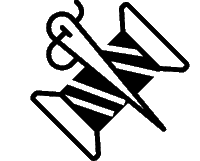| Re: OTD - 9th February (1963) - Lines blocked by snow Posted by rogerpatenall at 11:46, 10th February 2022 |     |
Wakes' double deck bus in snow, Castle Cary 1963 - hope the picture works, otherwise I will reduce the size and post later
| Re: OTD - 9th February (1963) - Lines blocked by snow Posted by CyclingSid at 07:07, 10th February 2022 |     |
As I remember it the first snow fell on Boxing day in Crewkerne while the main fall was a few days later.
Much the same on Hayling Island. The road past our house went through farmland as a sunken road. Waking up in the morning and peering through the frosty window there was lump in the snow, no sign of the hedges or any other features in the landscape. The lump was a Southdown double deck bus, last service of the previous day?. At the time Southdown had a rule that bus crew (driver and conductor in those days) were not allowed to leave a bus until relieved. Fortunately, in this case, the crew were two local lads (old enough to be my father, of course) and their wives ran a shuttle of tea cans to keep them going until somebody found a phone and got permission for them to leave the bus. It shows how ubiquitous the phone (line or mobile) has become in the following years. I don't remember us having a phone, and if we had I certainly wouldn't have been allowed to use it.
| Re: OTD - 9th February (1963) - Lines blocked by snow Posted by broadgage at 06:06, 10th February 2022 |     |
The first school that I attended still had open fires for heating, outside toilets, and some gas lights.
The plumbing in the outside toilets froze and the caretaker poured petrol into the urinal channel and ignited it. I was allowed to watch from a safe distance (about 3 feet)
A neighbour was reputedly killed by an electric shock when he placed a lit 60 watt lamp into the water in the WC flush cistern to stop it freezing.
Use of a lit light bulb was recommended to prevent the freezing of water cisterns. They did not actually state that the bulb was to be OUTSIDE the cistern and not immersed in the water !
A number of lives were lost in accidents caused by improvised heating and defrosting arrangements.
Home made electric blankets.
Charcoal burners used indoors.
Warming pans for beds, contained hot ashes.
Electric warming pans, contained electric lamps.
Home made electric heaters.
Home made oil lamps.
Fitting 15 amp fuses to lighting circuits so as to use MORE heaters on the lighting circuit.
Stealing electricity from the tramway overhead to get free electric heating.
Stealing electricity from street lamps.
Bypassing coin meters for gas and electricity.
| Re: OTD - 9th February (1963) - Lines blocked by snow Posted by stuving at 00:06, 10th February 2022 |     |
During the 60s there was a bit of an intergenerational battle going on about shorts for older boys. I was in the second form at grammar school, and was being told I would not get long trousers until the next year, which I really resented as I was part of a shrinking minority in my year.
No doubt Dad could say accurately enough that he'd walked two miles to school in the snow every winter; he was after all living on a farm in Aberdeenshire. And Mum would have been conscious that boys' knees mend themselves; trousers don't. But even they relented in the brutal cold of that winter, and in a few years you'd not see any boys sent to secondary school in shorts. There are probably a lot more now!
Our "home" classroom that year was in an old prefab hut (largely made of asbestos, I suspect), heated (using that work loosely) by a couple of cast-iron coke-burning stoves, front and back. After a few days of that we would start each day by trooping off, led by our form master, on a hunt for any spare space within the main building - which might end up being the hall balcony or a cloakroom. And a bit of the playing field had a low wall of snow built round it, and was flooded to provide a serviceable skating rink for a couple of weeks.
But I don't remember transport, meaning buses from north of Greenford to Harrow for me, being that seriously hit. Not enough to stop me getting to school, though it might be very late on occasion. Bus routes, apart from a few steep hills, can be cleared of snow fairly quickly, in a place like London. The same was I think true for the Underground. But that's just what my memory has to hand now.
| Re: OTD - 9th February (1963) - Lines blocked by snow Posted by Robin Summerhill at 21:41, 9th February 2022 |     |
The winter of 62/63 was a double edged sword as far as I was concerned.
I was 10 and our Primary School remained open. And yes all the boys were in shorts, because that was how things were in those days. Parents would be £done” for child abuse if they did that today...
In common with most families we had no central heating and, although the house was fitted with a number of fireplaces both upstairs and down, there was only one fire in the living room. And as I recall, the only heat we got from that was the heat that somehow got around the cat... In later years when I got deeply involved in energy efficiency I realised how much of the little heat there was in the house escaped up through those chimneys!
But on the railway front, I had become a train spotter the earlier September, ostensibly the same week as the passenger service on the Midland line out of Bristol was fully dieselised (this was important because I lived midway between Staple Hill and Mangotsfield stations at the time). It never was fully dieselised but, when the Big Freeze came, the Peaks went out of service and many Jubilees that had been stored at Burton on Trent were put back on class 1 passenger service. “Scots” that were withdrawn at the end of the summer timetable were reinstated too.
Yes the railways remained open, but punctuality was a shambles. U recall seeing the “Devonian” running 90 minutes down just beyond Mangotsfield with the fire effectively being thrown out of the chimney with the driving style, which also meant less disposal work to b done when it got to Barrow Road
I also remember waiting at Mangotsfield for the 1010 Bath GP to Bristol stopper, due around 1030 and always 3 coaches with an Ivatt class 2 or Standard class 3 tank at the business end. It turned up at 1150 with one coach and a Standard class 5 running tender first
Happy days? In some aspects yes, but in most aspects definitely not!
| Re: OTD - 9th February (1963) - Lines blocked by snow Posted by IndustryInsider at 17:00, 9th February 2022 |     |
Just over a month earlier there had been a rail crash at Coppenhall Junction north of Crewe caused by cold weather and snow. Just a 20mph collision speed, but the poor design of the coaches and the number of passengers on the trains led to 18 deaths.
https://www.railwaysarchive.co.uk/documents/MoT_Coppenhall1962.pdf
| Re: OTD - 9th February (1963) - Lines blocked by snow Posted by broadgage at 15:46, 9th February 2022 |     |
Youtube link to short film about the railway response to the 1963 snow.
https://www.youtube.com/watch?v=cl4pJwcE7JI
Note the restaurant car provided even in bad weather.
Also the number of cars stuck in the snow whilst the trains still operated. These days of course the railway would remain closed by snow, long after the roads had reopened.
Track workers without hi-viz clothing, or even gloves. Customers smoking. Milk being transported by train.
| Re: OTD - 9th February (1963) - Lines blocked by snow Posted by broadgage at 14:40, 9th February 2022 |     |
I just remember that winter, though I was a very young child. We still had a coal fire, and a solid fuel boiler for hot water.
From that era I recall a rather ineffective patent fuel called "cosyglow" and commonly known as "mouldy glow" sounds similar to that mentioned in the O/P.
There are some interesting rail related historical films on youtube including "snow 1963"
ISTR the late Fred Dibna calling patent smokeless fuels "good coal from which all the goodness has been taken out and used to make other things, the left over rubbish is then sold for the same price as real coal"
Coke of very poor quality was sometimes available free from gas works. It was almost fire proof. Both gas and electricity were in short supply in cold weather. Customers were warned not to leave burning gas unattended lest it go out.
| Re: OTD - 9th February (1963) - Lines blocked by snow Posted by Witham Bobby at 12:21, 9th February 2022 |     |
As I remember it the first snow fell on Boxing day in Crewkerne while the main fall was a few days later. The local crossing keeper at Crewkerne Gates had no need of opening the gates for many weeks. Sadly our school remained open!
Our school in Milverton remained open, too. Walking to school at the height of the top of the tall hedgerows in that part of the world. In shorts. My brother started school after the Christmas holiday - wasn't a great introduction to education for him
I was aware that the Taunton to Barnstaple line shut for a couple of days. Several years later, I was told the story by one of those who'd done the hard work of digging them out, that the Minehead branch was shut because three 0-6-0PT locos sent to clear the line from Taunton shed got stick in snowdrifts near to Crowcombe station, with the snow compacted densely around their inside motion
The Minehead branch came to the rescue of some people in West Somerset in 1978, when snow shut the roads in the area for several days
| Re: OTD - 9th February (1963) - Lines blocked by snow Posted by bradshaw at 22:17, 8th February 2022 |     |
As I remember it the first snow fell on Boxing day in Crewkerne while the main fall was a few days later. The local crossing keeper at Crewkerne Gates had no need of opening the gates for many weeks. Sadly our school remained open!
| OTD - 9th February (1963) - Lines blocked by snow Posted by grahame at 21:29, 8th February 2022 |     |
They don't make winters like they used to! - https://www.derbysulzers.com/snow.html
On February 9th [1963] two days of heavy snowfall blocked the Aviemore - Forres line in the area of Dava Moor. Despite the presence of snowfences about one and a half miles of line was blocked, with drifts to thirty feet. Several snowploughs were sent out to clear the line but these became derailed. One such train was powered by a Class 26 & 24, the plough ended up on its side, the Class 26 was completely derailed and sustained minor damage. Eventually forty nine men were used to clear the line, taking 21 days and a quantity of dynamite.
I remember that winter at the other end of the country in Petts Wood. Mum's friend Hilda Rowley was returning from a long stay in India, and Mum was determined to make sure she was warm. But the coalman at the station had long waiting lists for all the usual fuels, and the only thing available was known as "GloCo" and we ended up with bunkers of the *** stuff and concluded it was called "Glo" because all it did was glow, not burn.










